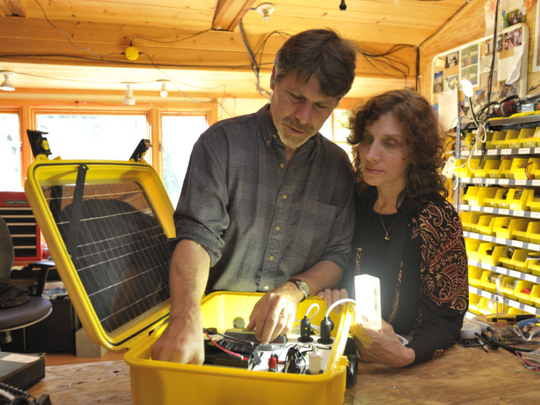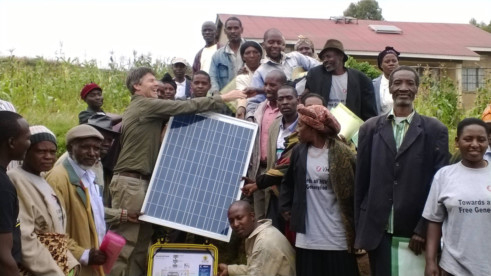
“How many of you have had to catch babies in darkness?”
What kind of a question is this, you might wonder?
But this question took Dr Laura Stachel, a California-based obstetrician-gynaecologist, on an entirely new mission, changing not only her life but of several others waiting to be born.
In 2008, when Dr Stachel visited Nigeria on a research project, the African country had one of the highest maternal mortality rates in the world. At the time, 500,000 women lost their lives each year from pregnancy related complications; 11 per cent of these deaths occurred in Nigeria.
Dr Stachel observed that in addition to the deplorable conditions in Nigerian hospitals, one grim factor contributing to the high mortality rate was long hours of suspended power supply.
In the absence of nighttime light, midwives and surgeons struggled to conduct deliveries and other procedures by the beam of a torch light, the glow of a kerosene lantern, and sometimes by the dim flicker of candlelight. Without power, there was no intercom system or way to charge mobile phones. Inevitably, this caused delay in attending to a woman in labour, and increased the risks of medical and surgical procedures.
To learn more from her colleagues about delivering babies in darkness, Dr Stachel interviewed midwives and doctors and the question she asked was: How many of you had to catch babies in darkness?
The stories that emerged left her stunned.
In one instance, a midwife struggling with a challenging delivery was desperate for light. She begged her assistant to set a match to the calendar on the wall. And, in the dying embers of that flame, a little one marked his entry into the world.
In another case, a breech baby was delivered in the light of a candle. Another breech baby was not so lucky. Although the baby’s body had emerged, the head was trapped. In the absence of electricity, the midwife fumbled while pulling out her mobile phone for a meagre source of light. It slipped from her hand and became non-functional. By the time the baby was delivered, it was stillborn.
Catching babies in the dark was not unique to Nigeria. In Malawi, expectant mothers carry their own candles or kerosene to clinics. For many living in poverty, these costs may be prohibitive, and women may elect to stay home and deliver without skilled care.
With the help of her solar educator husband, Hal Aronson, and a team of dedicated volunteers, Dr Stachel set out to change that. Aronson designed a special yellow suitcase to help health clinics face the challenge of intermittent or nonexistent power supply.
Now what is this yellow suitcase? The “Solar Suitcase” is a compact, portable and complete solar electric unit that provides essential power and medical lighting. It can be used as a mobile unit, or mounted to a clinic wall for a permanent solar electric installation. The box provides medical lighting, mobile-phone charging, and a foetal heart rate monitor, called a Doppler.
Initially developed to help demonstrate solar power to a hospital in Nigeria, it has become the most sought-after suitcase in Nigeria and other African countries.
Over the past five years, 1,000 Solar Suitcases have been distributed worldwide by “We Care Solar”, a not-for-profit organisation set up by Aronson and Stachel in 2010.
Their mission is to improve maternal healthcare and reduce the number of preventable maternal deaths in Africa and Asia.
Solar suitcases have travelled to Uganda, Malawi, Sierra Leone, Tanzania, Indonesia, Haiti, Ethiopia and Nepal, among other countries. We Care Solar receives funding from individual donors, foundations, and UN agencies for these programmes, partnering with local organisations that work to improve healthcare. In 2011, We Care Solar partnered with WHO and the Liberian Institute of Biomedical Research to bring 20 Solar Suitcases to Liberia. In 2012 and 2013, Save the Children, AMREF and Unicef implemented Solar Suitcase programmes in Uganda.
Dozens of Solar Suitcases were introduced to the Philippines in the aftermath of Typhoon Haiyan and more are scheduled to arrive in 2015.
In February 2015, the 1000th Solar Suitcase was packed and delivered to Sierra Leone to help rural health centres affected by the Ebola outbreak.
For Dr Stachel, deep fulfilment comes from knowing that Solar Suitcases have made a difference in the lives of many mothers and babies. In an e-mail interview, this mother of three shared her favourite story of the impact of a single Solar Suitcase.
Dr Jacques Sebisaho, a family practice doctor from the Democratic Republic of Congo brought a Solar Suitcase to his clinic on an island where there was no electricity. Soon after his arrival, he used the Solar Suitcase lights to safely deliver twins. But the next day, there was an outbreak of cholera.
For the next 30 days, he and his team treated 122 patients using the Solar Suitcase for support.
“He said that his clinic typically lost 50 per cent of patients with cholera. Usually 80 per cent of the deaths occur at night, but due to the Solar Suitcase they could monitor and treat patients through the night,” revealed Dr Stachel. “For the first time in the history of the island, none of the mothers, fathers and children with cholera died.”
Dr Stachel’s efforts have been recognised by the World Health Organisation. She also worked with United Nations Foundation for over two years on their Sustainable Energy for All Initiative.
“Now the UN has highlighted a high impact opportunity (HIO) on Energy for Women and Children’s Health. I’m so excited to have contributed to this effort, and to see how the world is now recognising the importance of reliable energy for health care,” said Dr Stachel, recognised in 2013 as a “Top Ten CNN Hero”.
Other honours include receiving the 2010 Ashoka Changemakers Award, the 2012 United Nations Association Global Citizen Award, the 2013 Katerva Gender Equality Award, and being one of the 2014 Top 10 Sustainia Innovative Solutions.
Yet, this journey was never planned. In fact, as a 17 year –old, Stachel had joined Oberlin Conservatory and College, America to train in piano and modern dance. A health issue later made her change track and pursue medicine at University of California.
Neither did she ever think of becoming a social entrepreneur either.
In the book, “The Rise of the Reluctant Innovator”, where her story is featured, Dr Stachel writes that it was her experience in watching women succumb during childbirth in Nigeria that put her on this new road.
“I left my clinical practice and went to study public health. In Nigeria, I watched women with severe pregnancy complications fighting for their lives in a hospital that had none of the infrastructure to which I was accustomed. I witnessed critically ill women labouring in darkness, and surgeons conducting c/sections where the lights went off. It was impossible to turn my back on the problem. What started out as a quest to provide light for one hospital, evolved into a project that has touched the lives of hundreds of thousands of people around the world? I feel so fortunate that my partner, Hal Aronson, had a practical solution that was feasible and could be brought to scale.”
The beneficiary clinics are usually government clinics that are under-resourced and they do not pay for the Solar Suitcases.
“There is usually a third party funder,” explains Dr Stachel.
“We are grateful for the support we receive from our donors, they make this work possible. We also include an educational programme along with the Solar Suitcase installations, and this is funded by grants as well.”
“When we work in a new country, we partner with organisations that focus on healthcare. We have a team of Solar Ambassadors to train local people in installing, using, maintaining and repairing Solar Suitcases,” she adds.
For more details, visit www.wecaresolar.org.
Mythily Ramachandran is a writer based in Chennai, India.













